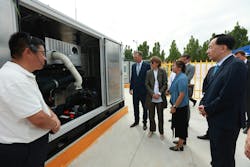Deutz Puts Hydrogen-Powered Generator Sets into Operation in China
Deutz last month put into operation the first power generators in Beijing that generate electricity using the hydrogen combustion engine developed by Deutz. At the same time, contracts were signed for a joint venture between Deutz and the Zhongguancun Summit Enviro-Protection State Innovation Zone (ZGC), which will drive the further distribution of hydrogen-powered generators (H2 gensets). The ceremony in Beijing was attended by Deutz CEO Dr. Sebastian Schulte; the lord mayor of Cologne, Henriette Reker; and the Beijing municipal committee member and vice mayor of Beijing, Jin Wei.
“The commissioning of the first of around 100 hydrogen-powered generators that we will supply to China demonstrates the potential of combining hydrogen and combustion engines,” said Schulte. “In Germany, we would do well not to give up on this technology, but to continue developing it in a climate-friendly way and to use it wherever it has significant advantages over electric drives and fuel cells.”
Deutz is one of the first engine manufacturers in the world to start series production of a hydrogen combustion engine. The basis for this is the delivery of 100 hydrogen-powered generators based on the TCG 7.8 H2 engine to the Chinese State Innovation Zone ZGC. The zone in Beijing is known as the “Silicon Valley of China” because of its science and technology center.
The 100 H2 gensets are to be used in China in the immediate vicinity of coking plants, among others. The waste gases produced there are currently all burned off. Hydrogen accounts for around a quarter of them and going forward this hydrogen will be separated and used to generate electricity on site with the gensets supplied by Deutz – with no additional carbon emissions. This means that the hydrogen engines will still reduce emissions, even without green hydrogen. By using grey hydrogen as a by-product of coking plants, each H2 genset can save up to 800 tons of CO2 per year. Yet, the H2 gensets can be operated climate-neutrally with green hydrogen at a later stage.
The hydrogen engine concept is based on conventional combustion technology. Instead of fossil fuels, this engine is fueled with hydrogen. The combustion of hydrogen does not produce CO2, but water (H2O). Another advantage is the flexible scaling of the generators on site.
The business with gensets, regardless of the fuel used, is becoming increasingly important for Deutz. With the recent acquisition of the US manufacturer Blue Star Power Systems, Deutz is focusing on the increasingly important decentralized energy supply, in which power generators play a relevant role. Deutz expects the acquisition to generate additional profitable revenue of more than U.S. $100 million to more than $U.S. 150 million per year in the medium term. Building on this, revenue in the energy sector is expected to grow to around €500 million by 2030 through organic and inorganic growth.
About the Author
Michael Roth
Editor
Michael Roth has covered the equipment rental industry full time for RER since 1989 and has served as the magazine’s editor in chief since 1994. He has nearly 30 years experience as a professional journalist. Roth has visited hundreds of rental centers and industry manufacturers, written hundreds of feature stories for RER and thousands of news stories for the magazine and its electronic newsletter RER Reports. Roth has interviewed leading executives for most of the industry’s largest rental companies and manufacturers as well as hundreds of smaller independent companies. He has visited with and reported on rental companies and manufacturers in Europe, Central America and Asia as well as Mexico, Canada and the United States. Roth was co-founder of RER Reports, the industry’s first weekly newsletter, which began as a fax newsletter in 1996, and later became an online newsletter. Roth has spoken at conventions sponsored by the American Rental Association, Associated Equipment Distributors, California Rental Association and other industry events and has spoken before industry groups in several countries. He lives and works in Los Angeles when he’s not traveling to cover industry events.
